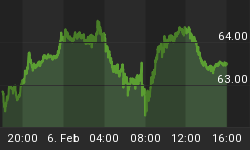There is wide agreement among economists and the financial media that our lackluster economic performance stems from continued "deleveraging" among consumers and businesses. Although it is certainly true that after decades of overly speculative borrowing, individuals and corporations are paying down debt, rebuilding their savings, and generally repairing their respective balance sheets. But these activities cannot be faulted for our economic malaise.
In fact, as a country, we haven't deleveraged at ALL. All the moves made by the private sector have been vastly outpaced by the federal government's efforts to add leverage to the economy. The net result is that we are much more indebted now than we were before the recession began; as a result, we are digging ourselves even faster into debt.
The good news is that households paid down debt for the 9th quarter in a row. In Q2, they deleveraged at a 2.3% annual rate, as their total debt outstanding dropped from $13.52 trillion to $13.45 trillion from Q1. That's still around 92% of GDP, which is way up from the 48% level in 1980, but the direction is positive. Ultimately, the message here could not be clearer: American households have decided - either voluntarily or involuntarily - that it is in their best interest to quit borrowing money and reduce their debt levels in order to reconcile their balance sheets. The bad news is that most economists view this as a pernicious tendency.
To counter the trend, economists have called for government to provide the spending that others have deferred - and the feds have been thrilled to comply. In fact, during Q2, Washington accumulated debt at a 24.4% annualized rate! So, even though households and state and local governments have begun to learn some valuable lessons, DC still managed to increase the overall level of non-financial debt in the US to a record $35.45 trillion. In an era of supposed deleveraging, the rate of debt accumulation has increased from 4.5% to 4.8% annualized over the past quarter.
By focusing solely on the behavior of the private sector, and ignoring the equally important fiscal habits of government, the financial media and mainstream economists have displayed a dangerous blind spot in their thinking. They fail to understand or acknowledge that borrowing done by a household or a government is virtually the same thing. The US government does have any independent means to generate wealth to pay off debt. It doesn't own factories or mines, and it does not operate a profitable service-sector business. It does not have an independent store of savings in another dimension, from which it can produce goods outside the bounds of economic law.
In the real world, all government stimulus comes from borrowing, spending, or printing, or to put it another way: deferred taxation, capital redistribution, or inflation. That means all US debt is ultimately backed by the tax base of the country. Therefore, whether the consumer or the government that does the borrowing is really unimportant because, in the end, it is the consumer that will receive the bill.
Meanwhile, government interventions are particularly pernicious because they encourage short-sighted behavior in the private market as well. It was reported today that corporations are using the rock-bottom interest rate environment to execute leveraged buybacks of their shares. While this temporarily increases shareholder value, it ultimately leaves the corporations - and the broader economy -- even further in debt.
As of Q2 2010, total non-financial debt is rising at a 4.8% annual rate but GDP is growing at only 1.6% annualized. US debt as a percentage of GDP continues to climb, which should put to bed any talk of a deleveraging or deflating economy. Consumers are clearly only part of the equation - and, for now, the smaller part. The US government, in fighting the claimed deleveraging, is sending the total debt level into the stratosphere. As we watch it soar upward, the dollar steadily drifts downward.
For in-depth analysis of this and other investment topics, subscribe to Euro Pacific's Global Investor Newsletter. Click here for your free subscription.
Click here to download Euro Pacific's Special Report: My Five Favorite Gold & Silver Mining Stocks.
Be sure to pick up a copy of Peter Schiff's just-released economic fable, How an Economy Grows and Why It Crashes.















